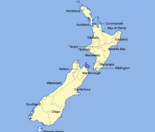The au pair experience offers a fantastic opportunity for young adults to immerse themselves in a new culture while providing childcare support to a host family. In exchange, au pairs receive accommodation, meals, and a chance to explore a different part of the world. New Zealand, with its stunning landscapes and welcoming people, is a particularly appealing destination for an au pair adventure.
Let’s delve into the specifics of becoming an au pair or a host family in New Zealand!
Part 1: Au Pair in New Zealand
An au pair is a young person from abroad employed by a host family to care for their children. As a member of the family, au pairs provide live-in childcare and a unique cultural and learning experience.
The title comes from the French term au pair, meaning “on a par” or “equal to”, indicating the importance of the family dynamic to the experience. The au pair is considered an equal member of the household. In fact, au pairs often maintain an extraordinarily close relationship with their former host family for many years after the placement has ended.
An au pair provides in-home, dedicated childcare. Au pair education and care is focussed on providing a stable and secure environment for children in their own home, ensuring each child gets the full attention and support they need in their early years of life. An au pair’s responsibilities can include:
- Childcare and education. Encouraging, guiding and supporting children in your own home
- Ensuring routines such as nappy changing, changing of clothes, bottle feeding, bedtimes are carried out
- Waking the children in the morning and helping them to get dressed
- Preparing meals for your children
- Helping your child/children take care of their belongings and tidy areas of play
- Taking your child to playgroups, child outings, school and other activities such as sport
- Washing and organising your child’s clothes throughout the working week.
Au Pair vs Nanny
The key differences between an au pair and nanny are:
- An au pair typically travels from overseas for the express purpose of joining their host family, although there are often candidates in New Zealand, travelling on a working holiday visa.
- An au pair is often at the younger end of the age spectrum (between 18-30 years old).
- An au pair is nearly always live-in, so they’re able to provide after-hours care as well- for example, babysitting – ideal for busy parents!
- The au pair weekly wage is typically only $190 to $230 net per week (plus room and board), whereas nannies are likely to charge more due to there being no board and lodgings component to their wage.
Au pair Eligibility Requirements
Au pair requirements typically include:
-
- Age: You must be between 18 and 30 years old.
- Nationality: You’ll need to be a citizen of a country with a Working Holiday Visa agreement with New Zealand. Check the latest list of eligible countries on the New Zealand Immigration website.
- English Language Proficiency: You should have a good conversational level of English to communicate effectively with your host family and navigate daily life in New Zealand.
- Financial Requirement: You must have at least NZ $4,200 in your bank account to demonstrate you can support yourself at the start of your stay.
- Previous Visa: You cannot have previously participated in the Working Holiday Visa scheme in New Zealand.
- Family Status: You must be unmarried and without children.
- Have a clean police record
- Have a valid driver’s license
- A reputable au pair agency should require a minimum level of childcare experience (especially for au pairs caring for children under 5 years of age).
The Au Pair Application Process
1. Find a Host Family In New Zealand via:
-
- Au Pair Agencies: Agencies specialise in matching au pairs and host families. They often provide support with the visa process and can offer guidance throughout the experience.
- Online Platforms: Websites such as AuPairWorld allow you to create a profile and directly connect with potential host families.
2. Provide Required Documents:
-
- References: Written recommendations from previous childcare or work experience.
- Police Background Check: A document confirming you have no criminal record.
- Medical Form: A general health assessment from your doctor.
3. Write a compelling Au Pair Profile: Take time to craft a compelling au pair profile that highlights your personality, childcare experience, and reasons for wanting to come to New Zealand. Include photos and consider adding a video introduction to make your profile stand out.
4. Match with Families: Browse host family profiles and initiate contact with those who seem like a good fit. Communicate openly about expectations and lifestyle to ensure a successful match.
Au Pair Visa Information
As an au pair in New Zealand, you won’t have a specific “au pair visa”. Instead, you’ll need to apply for a Working Holiday Visa. Here’s what you need to know:
Working Holiday Visa Application Process
-
- The application is primarily done online through the New Zealand Immigration website.
- Create an account and complete the application form.
- Pay the application fee online.
Necessary Documentation
-
- Valid passport
- Proof of funds (at least NZ $4,200)
- May require medical examination results and/or a chest x-ray depending on your country of origin.
- Police clearance certificate (background check)
Travel Insurance
-
- While not a strict visa requirement, obtaining comprehensive travel insurance is highly recommended. This covers unexpected medical expenses, lost luggage, trip cancellations, and other potential emergencies.
Important Note: Visa requirements and the number of available visas per country can change. Always double-check the latest information on the official New Zealand Immigration website.
Au Pair Expectations and Responsibilities
Understanding the roles and expectations of both the au pair and host family is key to a successful experience. Here’s a closer look:
Typical Childcare Duties
-
- Getting children ready for school or nursery
- School pick-ups and drop-offs
- Helping with homework
- Preparing meals and snacks
- Engaging children in play and activities
- Bathing, dressing, and bedtime routines
Light Housework
-
- Keeping children’s rooms and play areas tidy
- Children’s laundry
- Assisting with simple meal preparation
- Helping keep general living areas organised
Working Hours and Pocket Money
-
- Work schedules are typically agreed upon between the au pair and host family but should adhere to guidelines. Aim for a maximum of 30 hours of work per week and a minimum of two full days off.
- Pocket money is also negotiated but should provide the au pair with enough to comfortably explore and enjoy New Zealand during their free time. Check with au pair agencies or online resources for current recommended amounts in New Zealand.
Cultural Immersion and Becoming Part of the Family
-
- Au pairs should be eager to learn about New Zealand culture, try new foods, and actively participate in family outings.
- Host families should welcome their au pair as a temporary family member, include them in activities, and help them navigate life in New Zealand.
Important Note: It’s crucial to have an open and detailed conversation about expectations prior to the au pair’s arrival. A written contract outlining duties, schedules, pocket money, and holidays is highly advised.
Part 2: Host Families in New Zealand
Hosting an au pair can be a wonderful experience for families in New Zealand. It provides flexible and culturally enriching childcare, while welcoming a new member into your household. If you’re considering becoming a host family, let’s explore the reasons why you might choose this option and your responsibilities within this unique arrangement.
Finding the perfect au pair
When reviewing au pair candidates, it’s important to think carefully about what you require. Do you need someone who can drive? Do you want an au pair with experience caring for babies or with special education needs children? Make sure that you clearly articulate your requirements to your au pair agency to help them recruit someone who will meet your needs and experience requirements.
What countries do au pairs come from?
Au pairs can come from all over the world! Generally, however, we’ll see candidates come from places as diverse as Germany, Sweden, France, USA, Canada, and some parts of Asia. Au pairs usually enter New Zealand on a working holiday visa. Some countries don’t have a working holiday scheme with New Zealand, and sometimes there are limits around the number of visas issued for certain countries (for example, the Phillipines). Countries with the best New Zealand working holiday schemes include Germany, Sweden, France, USA, the United Kingdom and Canada – these countries are typically where most au pairs in New Zealand come from.
It’s important to remember that what makes a great au pair is a positive attitude, willingness to learn and love of children. The country of origin merely adds a special “flavour” to the experience!
Host family requirements
As part of the package offered to au pairs by their host family, an au pair must have a dedicated and separate bedroom as well as suitable access to a bathroom. Access to a computer, TV, books etc is preferable, as the aim is for them to enjoy their experience as part of the family! An au pair must have at least three meals per day (free of charge), as well as uninhibited access to all food and typical household amenities. There must be sufficient space in your home to accommodate an au pair as a live-in employee.
Becoming an employer, it’s easy!
An Au Pair who you select to join your family will be employed by you personally for the duration of the Placement Term (length of stay). As an employee, an Au Pair is entitled to all the benefits and rights that a normal employee enjoys under New Zealand law. For example, an Au Pair is entitled to annual holidays and public holidays as set out in the Holidays Act.
How do I find an Au Pair?
The International Au Pair Association (IAPA) and recommends that families always use a reputable and local agency when looking for an au pair. The agency can arrange a written contract between the family and au pair, can validate references and offer a rematch policy if the initial placement doesn’t work out. The use of internet matching services is not recommended. Au Pairs and Host Families are warned to stay away from internet sites that offer a “quick” placement without doing the hard work (for example, appropriate reference checks, interviews and police/medical record checks).
Why use an au pair agency?
An au pair agency will not only recruit and screen/check candidates, they should also provide ongoing support through the placement term (length of stay). Be wary of agencies that do not have a local presence and that cannot provide you and your au pair with ongoing support throughout the placement term. A reputable Au Pair agency should provide:
- Full screening process (including personal Au Pair and family interviews, reference checks, childcare experience, police and medical record checks)
- Organisation of flights, visas and insurance for your Au Pair
- An orientation course for the Au Pair when they arrive in New Zealand
- Professional contracts and employment agreements
- A guarantee or “re-match” policy – if the Au Pair should not be suitable
- Ongoing and local support – including activities, events, playgroups and mediation services
Au Pair wages and tax
Au pair wages are typically between $190 to $230 net per week for up to 40 hours of work (excluding tax, room and board). Some agencies also provide a Demi Au Pair option – where the au pair works only 10 to 20 hours per week and earns $60 to $120 net per week.
Au pairs typically enter New Zealand on a working holiday visa or student visa. Anyone working in New Zealand on a working holiday visa or student visa enjoys the same benefits and rights under New Zealand Employment Law as any other employee in New Zealand, including annual and sick leave, as well as public holidays.
Because the au pair becomes your employee, you’ll need to register as an employer with the IRD (don’t worry, it’s easy!) and comply with all relevant New Zealand tax and employment legislation including (but not limited to):
- The Employment Relations Act
- The Holidays Act
- The Minimum Wage Act
- The Health and Safety in Employment Act
A reputable au pair agency should be able to provide you with tax advice, your employment obligations and even a payroll service. Remember, the whole au pair employment package is taxable (that includes the cash payment to the au pair as well as room and board). Income tax is not just paid on the cash component – it must also be paid on room and board as well.
Important Note: Laws and regulations can change, so always check for the most up-to-date information on official government websites or consult with a legal professional if needed. If you have any questions about tax or your employment obligations – contact Au Pair Link, the Inland Revenue Department or the Department of Labour.
A Note to Au Pairs and Host Families
Choosing to become an au pair in New Zealand, or to welcome an au pair into your family, is more than just a childcare solution – it’s a gateway to a life-changing adventure and a unique cultural exchange.
If you’re an aspiring au pair, remember that thorough preparation and realistic expectations are key. Embrace the journey, be open to learning, and New Zealand will reward you with unforgettable experiences.
For families, hosting an au pair can bring extra flexibility and a vibrant international flavour into your home. Set clear expectations, extend a warm welcome, and you’ll build a lasting connection while gaining a new perspective on the world. You might also like to read our article on tips for having a great relationship with your au pair.
Whether you’re the au pair or the host family, the experience has the potential to be enriching for everyone involved. If you’ve done your research and feel ready to take the leap, I encourage you to embrace this exciting opportunity for cultural exchange and personal growth in stunning New Zealand!






